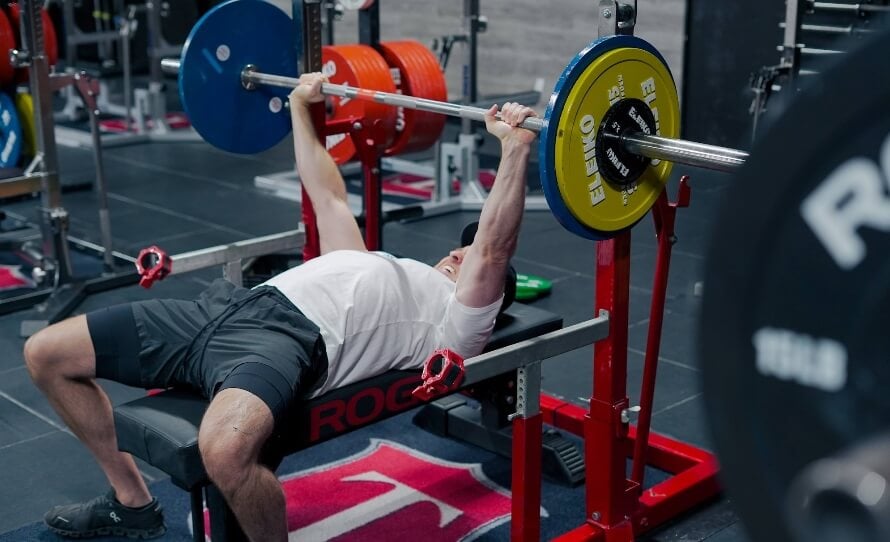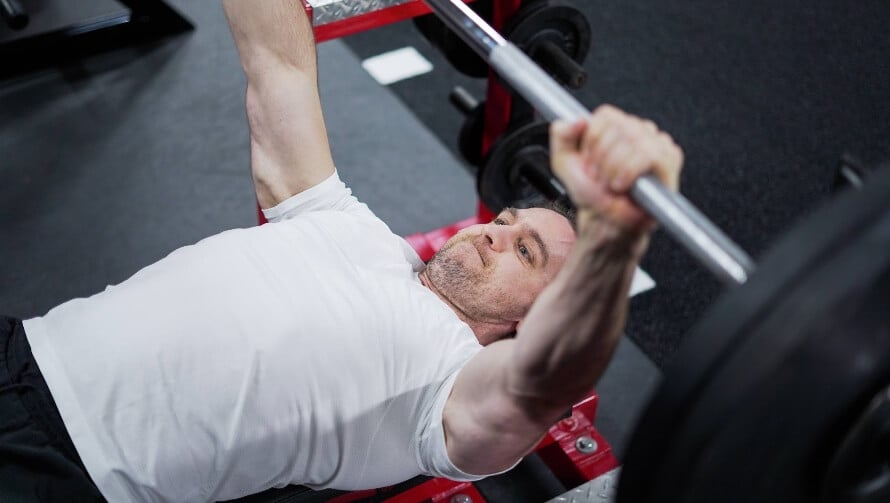
Who else can vividly remember the disappointment of the moment you realized just how hard it is to bench a few plates?
And if that wasn’t humbling enough, it happens all over again when you pick up dumbbells—except this time the weights are lighter and the struggle feels completely different.
More wobbly. More awkward. More frustrating.
Most people never understand why these two seemingly similar exercises feel—and work—so differently. And because of that, they’re not sure how to choose between them or how to use both for maximum muscle and strength gain.
If that sounds familiar, you’re in the right place. This guide breaks down everything you need to know about the barbell and dumbbell bench press—how they differ, which is best for your goals, which is safest, and how to program both effectively.
Key Takeaways
- Both barbell and dumbbell bench press build muscle and strength, but barbells have a slight edge for gaining maximal strength because you can lift heavier weights and progress in smaller jumps.
- Dumbbells feel harder because each arm works on its own, stabilizer muscles work more, the range of motion is longer, and even getting into position costs energy.
- Dumbbells offer more freedom of movement, which many lifters find friendlier on the shoulders, wrists, and elbows—and they’re easier to bail out of if you fail a rep.
- Barbells are more stable but carry a higher risk when training heavy because a failed rep can trap you under the bar if you don’t use safeties or a spotter.
- You don’t need to choose between the barbell and dumbbell bench press—the best approach is to use both: barbells for heavy pressing, and dumbbells for doing more volume without hurting your joints.
Table of Contents
+
Barbell vs Dumbbell Bench Press: Which Is Better for Gaining Muscle and Strength?

Both the barbell and dumbbell bench press are excellent exercises for gaining upper-body muscle, strength, and power.
That said, the barbell bench press likely has a small edge—especially for gaining maximal strength. Research shows you can typically press about 15–20% more weight with a barbell than with dumbbells, which matters because lifting heavy loads is the most reliable way to get stronger over time.
You can also produce more power with a barbell than with dumbbells. Pressing heavy weights powerfully—not slowly—is generally better for improving strength and building muscle.
Barbell bench pressing is also more stable and lets you increase the weight in smaller increments, both of which make long-term progress more manageable.
Dumbbell pressing has advantages, too.
It usually lets you train through a slightly larger range of motion, activate and stretch your pecs more, and squeeze out a few more reps with a given weight than the barbell press—all of which contributes to muscle growth.
Dumbbells also force each side of your body to work on its own, which helps prevent uneven chest development—and they’re still excellent for building strength.
The trade-offs are that dumbbells are tougher to get into position, trickier to stabilize, and harder to progress on because the weight jumps between dumbbells are often too large.
That’s why, if you had to pick only one exercise for long-term strength and muscle gain, the barbell bench press probably has the slightest of edges.
So should you only barbell bench press?
No.
Unless you’re a powerlifter, there’s no need to only bench press with a bar. A smarter approach is to do both: barbell bench press for your heaviest training (the weights closest to your bench press one-rep max), and dumbbells for doing extra volume (sets) and ensuring your pecs develop proportionally.
How Barbell and Dumbbell Bench Press Differ in Mechanics and Range of Motion
Whether you press a barbell or dumbbells, the movement looks similar. But under the hood, the setup, bar path, and stability demands are a bit different. Here’s a simple breakdown:
Barbell vs. Dumbbell Bench Press: Mechanics and ROM
| Feature | Barbell Bench Press | Dumbbell Bench Press |
|---|---|---|
| Setup | Lie under a bar in a rack, set your grip, and lift it out over your chest. Simple and stable. | Sit with the dumbbells on your thighs, then lie back and kick them to your shoulders. Harder to control as the weights get heavier. |
| Movement | Both hands are fixed on the bar, so grip width and movement are the same every rep. | Each arm moves on its own. Hands come closer together at the top and out to the sides at the bottom. |
| Range of Motion | Good range of motion, but the bar can limit how deep you go at the bottom. | Often allows a slightly deeper stretch at the bottom and a closer squeeze at the top. |
| Stability Demand | More stable—the bar links both arms together and the weight feels more “connected”. | Less stable—each arm has to balance its own weight, so each rep feels wobblier and more demanding. |

How to Use Both Barbell and Dumbbell Bench Press in Your Training

There are a few easy ways to combine the barbell and dumbbell bench press so you get the benefits of both.
One option is to start your chest or push workouts with the barbell bench press, when you’re freshest and able to lift the most weight. Then do dumbbell pressing later in the workout for extra volume.
This is the same approach I advocate in my best-selling men’s program, Bigger Leaner Stronger, and it’s also how most clients in Legion’s body-transformation coaching program train—and the results speak for themselves.

Another option is to split them across the week—barbell bench on one day, dumbbell bench on another. This lets you train heavy on one day and focus on hypertrophy on the other.
Or if you’d prefer to keep just one in your training at a time, do barbell bench press for 8–10 weeks, take a deload, then switch to the dumbbell bench press for the next 8–10 weeks, and repeat. This works well if you have limited time to train and only do one “horizontal press” per week.
Why Does Dumbbell Bench Press Feel Harder Than Barbell?

The dumbbell bench press usually feels harder than the barbell version for several reasons.
First, dumbbells force each side of your body to work independently. With a barbell, both hands are locked to the same bar, so your stronger side can help your weaker side as you fatigue. With dumbbells, the set ends the moment your weaker arm starts to wobble or fail—even if the other side could keep going.
Second, dumbbells require far more stabilization. Each arm has to control its own weight through space, which makes your shoulders, upper back, and smaller stabilizer muscles work much harder. This extra demand makes each rep feel heavier and more fatiguing.
Third, dumbbells usually take your muscles through a slightly longer range of motion. You can lower the weights deeper and press them together, which increases the total work your chest, shoulders, and triceps have to do each rep.
And fourth, getting into position with dumbbells costs energy. Hoisting two heavy dumbbells up to your chest and settling into a stable starting position takes effort on its own. There’s far less wasted energy when setting up for the barbell bench.
Is the Dumbbell Bench Press Safer than the Barbell Bench Press?

Dumbbells require more stabilization, coordination, and control than a barbell, so when you’re learning the movement, there’s a bit more room for things to feel wobbly or awkward.
Once you’ve got the hang of the exercise, though, dumbbells usually feel safer. They let your arms move more freely, which often feels more natural—especially if you have cranky shoulders, wrists, or elbows. And if you ever fail a rep, you can simply drop the dumbbells away from your body.
The barbell bench press, on the other hand, is more stable, which reduces the chance of losing control mid-rep. But it comes with one major risk you don’t have with dumbbells: getting pinned under the bar if you fail a rep.
That’s why it’s important to use safety arms or a spotter whenever you’re lifting heavy or pushing close to “failure.”
Barbells also lock your hands into one fixed position, which some people find uncomfortable on their wrists, elbows, or shoulders. Small tweaks—like adjusting your grip width or tucking your elbows—can usually fix this, but dumbbells still tend to offer more joint-friendly freedom of movement.
In short, dumbbells demand more control but are easier to bail out of, while barbells feel more stable but require proper safety setup when lifting heavy or close to failure.
The Bottom Line on Barbell vs Dumbbell Bench Press
Both the barbell and dumbbell bench press are excellent for building a strong, muscular upper body. You don’t need to choose between them—and for most people, using both is the smartest approach.
The barbell bench press has a slight edge for gaining maximal strength and power because you can lift heavier weights, progress in smaller jumps, and stay more stable under heavy loads. These factors make long-term strength and muscle gain easier to achieve.
The dumbbell bench press, on the other hand, offers a longer range of motion, more freedom for your shoulders and wrists, and a better way to keep both sides of your body equally strong and developed.
It feels harder because your stabilizers have to work overtime, but it’s also easier to bail out of and often more comfortable for your joints.
If you had to pick only one, the barbell bench press probably wins by a small margin. But dumbbells are still highly effective, and the research shows they can build strength and power just as well on a relative basis. You just won’t reach the same absolute numbers because you can’t load dumbbells as heavy.
FAQ #1: Are dumbbells or barbells more effective for bench press?
It depends on what you want out of the exercise. Both build muscle well, but barbells let you lift heavier and produce more power, which gives them a small advantage for maximal strength.
Dumbbells, however, train the same muscles to a similar degree, challenge your stabilizer muscles more, and are generally gentler on your joints, which some people prefer.
Most lifters will get the best results by using both.
FAQ #2: Can you build muscle with just dumbbells and a bench?
Yes. Research shows that training only the dumbbell bench press can increase both strength and power. Dumbbells also let you train through a longer range of motion, more deeply stretch your pecs, and activate your pecs to a higher degree—all helpful for muscle growth.
For a chest workout using only dumbbells, check out this article:
The Best Dumbbell Chest Workouts for Pec Growth & Strength
FAQ #3: Why is my dumbbell bench press so much weaker than my barbell bench press?
Dumbbells require more control and stabilization, and each arm has to work on its own. With a barbell, your stronger side can help your weaker side, and the bar path is more stable.
Feeling weaker with dumbbells doesn’t mean anything is wrong—it’s just how the exercise works.
FAQ #4: Is a 70-lb dumbbell bench press good?
It depends on your body weight, training experience, and how many reps you can do.
For example, if you’re 200 pounds, have been lifting for years, and can press 70-lb dumbbells for a single rep, that’s not especially notable. But if you’re 160 pounds, relatively new to training, and can press 70-lb dumbbells for 8–10 reps, that’s very impressive.
FAQ #5: Should I replace barbell bench press with dumbbell bench press?
You can if you prefer it. Research shows dumbbell-only training still improves barbell strength, meaning there’s good carryover. But if you want to maximize strength, you’ll still want some barbell work.
For most people, the best approach is to rotate phases that focus on one lift at a time or include both within the same week.
Want More Content Like This?
Check out these articles:
- Increase Your Bench Press Max With 16 Science-Backed Techniques
- What Muscles Does Bench Press Work? An Evidence-Based Guide
- Is the Bench Press Enough to Train Your Triceps?
Scientific References +
- D. Littlefield, Jared, et al. “Comparison of Lift Velocity and Power Output between Barbell and Dumbbell Bench Presses.” Journal of Trainology, vol. 10, no. 1, 8 May 2021, pp. 5–9, https://doi.org/10.17338/trainology.10.1_5. Accessed 27 May 2021.
- Farias, Déborah de Araújo, et al. “Maximal Strength Performance and Muscle Activation for the Bench Press and Triceps Extension Exercises Adopting Dumbbell, Barbell, and Machine Modalities over Multiple Sets.” Journal of Strength and Conditioning Research, vol. 31, no. 7, July 2017, pp. 1879–1887, journals.lww.com/nsca-jscr/Abstract/2017/07000/Maximal_Strength_Performance_and_Muscle_Activation.15.aspx, https://doi.org/10.1519/jsc.0000000000001651.
- Androulakis-Korakakis, Patroklos, et al. “Optimizing Resistance Training Technique to Maximize Muscle Hypertrophy: A Narrative Review.” Journal of Functional Morphology and Kinesiology, vol. 9, no. 1, 29 Dec. 2023, pp. 9–9, https://doi.org/10.3390/jfmk9010009.
- Smoak, Yonathan. “A Randomised Trial Comparing Barbell and Dumbbell Bench Press on Maximal Strength and Power Output.” Journal of Strength and Performance, vol. 2, no. 1, 9 May 2023, www.journalofstrengthandperformance.com/pub/2ce996b2/release/1, https://doi.org/10.21428/6404b16e.2ce996b2. Accessed 28 Jan. 2024.










